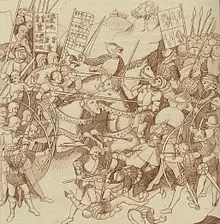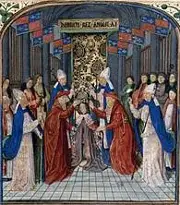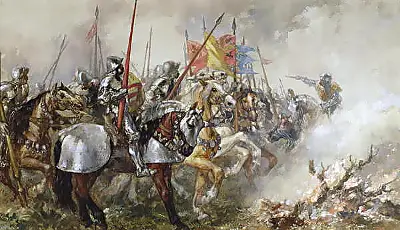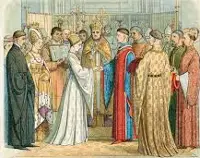King Henry V of England
Henry V was one of England's most famous kings. A proven warrior and military tactician, he gained great fame for the stunning victory at the Battle of Agincourt, during the Hundred Years War, and for rousing England into a sense of national unity. His reign as king, however, was brief: He was on the throne for only nine years. 
He was born at Monmouth, Wales on either Aug. 9, 1386, or Sept. 16, 1387. (Historians differ on this to this day.) His father was King Henry IV, and his mother was Mary de Bohun. Henry was the oldest of his parents' six children. He received a top-quality education, mastering not only riding, hunting, and fighting, but also music and literature. (He spoke English, French, and Latin.) His father was about to fight a duel to the death, in 1397, when King Richard II banished both his father (for a decade) and his intended opponent, the Duke of Norfolk (for life). Richard kept young Henry at court with him and later knighted him. Two years later, when Henry Bolingbroke returned to England on a wave of popular support, young Henry was with Richard on campaign in Ireland. Richard II found himself abdicating in favor of Henry and agreeing to imprisonment. Young Henry then became the Prince of Wales, heir to the throne. 
Young Henry proved a worthy fighter, leading his father's forces to victory over the Welsh leader Owain Glyndŵr and then defeating an uprising led by Henry "Hotspur" Percy at the Battle of Shrewsbury. In that July 21, 1403, battle, Henry sustained an arrow wound to the face but would not leave the fight. Henry brought the Welsh uprising to a close in 1408. The Prince of Wales took over the king's council in 1410. Nearly right away, father and son had several disagreements about policy. The king revoked his son's right to be on the council in 1411 and then sent an armed to France that was led not by his son but by his brother, Prince Thomas. 
Henry became king on March 20, 1413, when his father died, and was crowned on April 9. Having suffered through a land divided, he set about putting to rest the conflicts that had dogged his father's reign. For a start, he had Richard II honorably reinterred, satisfying to some extent those who still saw Henry IV as a usurper. To those who had lost lands and titles, Henry V restored favor. Unlike his father, who had to fend off multiple rebellions, Henry V faced really only one challenge to his reign, a plot to install Edmund de Mortimer on the throne in 1415 that was itself a later development in a rebellion that had challenged Henry IV a decade earlier. (Joining this rebellion was Henry's old friend John Oldcastle.) Henry also gained favor by choosing to pardon many criminals who agreed to fight in the English army overseas. The new king set about putting England on a course of greatness, trumpeting the idea of his country as a great nation and working hard to capitalize on the unity that he had crafted through his initial acts of benevolence. Also at this time, he became the first monarch to decree that all government documents be written in vernacular English. (Previous governments had preferred Latin and Norman French.) Henry also chose to renew the fighting in France, making the Hundred Years War "hot" again. He landed on French shores in 1415 with a force of 12,000 men and 20,000 horses. The initial destination was Harfleur, and the English siege of that port town was eventually successful–but not before an illness had ripped through the victorious army, depleting it by several thousand. 
Henry pressed on toward Calais, but he didn't get there before encountering a French army 20,000 strong. The result was the Battle of Agincourt, which occurred on Oct 25, 1415. In a somewhat repeat performance of what happened at Crécy in 1346, the English again had far fewer forces but again overcame those odds in extraordinary fashion. Henry V himself led the fighting. English and Welsh longbows, nearly 80 percent of the English force, cut down the first French charge, the second got bogged down in the mud, and the third didn't have the heart to trudge through so many French dead and fled the field. The result was a smashing victory for England and one that generated so many French prisoners that Henry, fearing a prisoner riot, ordered the prisoners executed, in violation of the unwritten rules of warfare. French dead numbered nearly 7,000; English dead numbered a few hundred. Henry capitalized on his stunning victory by retaking Normandy. He captured Caen and then Rouen, the latter after a six-month siege in which he refused to help thousands of Rouen residents who had fled the city and were trapped between city walls and English soldiers. 
Five years after Agincourt, Henry and King Charles VI signed the Treaty of Troyes. As part of the terms of that treaty, Henry married Charles's daughter, Catherine of Valois, with the idea being that their children would inherit the French throne. Henry was, in effect, the heir to the throne, displacing the Dauphin, the king's son. Henry benefited from his brothers' war prowess. His brother John, Duke of Bedford, scored a big victory over the French fleet and also subdued an uprising in Scotland. Another brother, Humphrey, Duke of Gloucester, proved adept at siege warfare, taking a large handful of key locales while Henry's army ranged far and wide. After a brief setback in which Henry lost yet another brother, Thomas, Duke of Clarence–who couldn't replicate his brother's success against a larger French force and died on the field of battle in March 1421–Henry targeted Meaux, a town held by the Dauphin. What was planned as a short siege lasted eight months. Henry finally had his victory in May 1422. He didn't live much longer. The king fell ill, and he died on August 31. His son, also named Henry, was 9 months old. |
|
Social Studies for Kids
copyright 2002–2024
David White




